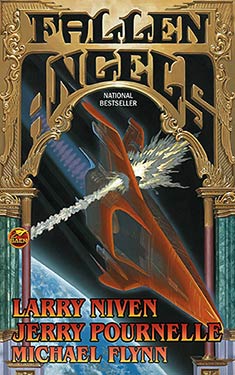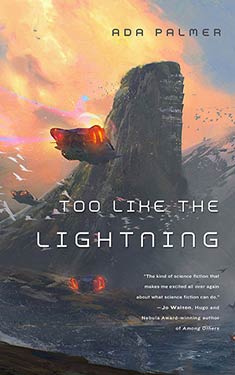Larry Niven, Jerry Pournelle, Michael Flynn
Completed 6/11/2017, reviewed 6/18/2017
3 stars
I hate writing reviews so long after reading a book. Unless I’m actively thinking about a book
during that time, I lose so many of my thoughts. I finished this book a week ago, but I simply
didn’t have the time to sit down and collect my thoughts. Finally, I have the time. I’ll try my best to convey why I think this
book is a three star book.
 The premise is pretty interesting. In the future, environmentalists have gained
power in the government and stopped global warming. Unfortunately, that restarted the ice age
that was being held back by the rising temperatures. The environmentalists are also luddites,
eschewing technology in most forms. They’ve
even outlawed science fiction because it condones the use of technology. The inhabitants of a space station, Freedom,
became an independent nation, refusing to return to a country that bans
technology. While they are more or less
self-sufficient, they occasionally need nitrogen from the atmosphere to replenish
their supply. To get the essential gas,
they send down a ship to scoop it up and return it to the station.
The premise is pretty interesting. In the future, environmentalists have gained
power in the government and stopped global warming. Unfortunately, that restarted the ice age
that was being held back by the rising temperatures. The environmentalists are also luddites,
eschewing technology in most forms. They’ve
even outlawed science fiction because it condones the use of technology. The inhabitants of a space station, Freedom,
became an independent nation, refusing to return to a country that bans
technology. While they are more or less
self-sufficient, they occasionally need nitrogen from the atmosphere to replenish
their supply. To get the essential gas,
they send down a ship to scoop it up and return it to the station.
The story opens with one such mission to get nitrogen, but
the spaceship is shot down and the two spacemen land on the North Dakota Glacier. A rag-tag group of science fiction fans from
a convention race to the rescue of these fallen angels. But can they get them back to their space
station before the government finds and arrests the angels?
The plot is pretty humorous and by admission of the authors,
it is a satire on environmentalist extremism.
On that note, I think the book hasn’t held up well over time. Environmentalists today are not the luddites
that they may have been 30 years ago.
But the satire is still funny despite the aging.
The best part of the book is the SF convention jokes. They’re not even jokes, Niven et al. caught
the nature of conventions. From the
description of the people to the chaos of the convention, it is a slice of what
conventions are really like. It should be
noted that the convention is being done in secret, because of the government’s
ban on SF.
As I mentioned before, the book hasn’t aged well. For example, fax machines are still in use
and cell phones didn’t evolve. However,
it is surprisingly close to the current real world anti-science government that
is creating the global warming backlash. And I don’t think there is any science these
days indicating that we are on the brink of a postponed ice age.
I give this book three stars out of five. It’s fun, even though some of the parallels
to our current government is a little depressing. It’s dated and the science is dubious. But most importantly, it’s about the fans of
SF being the heroes of their own SF adventure.

